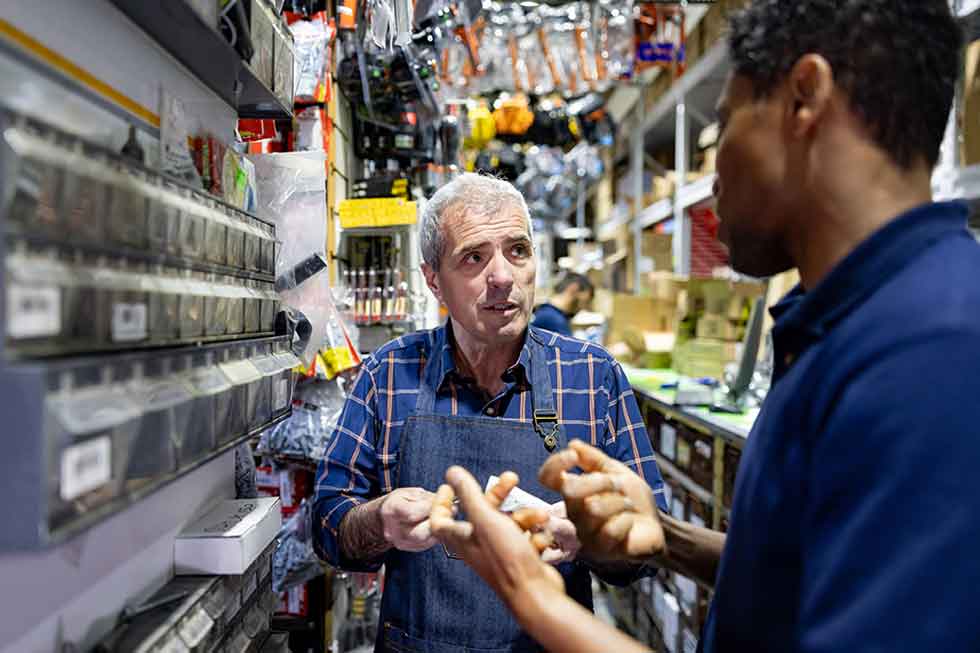Growing up in Renton, I fondly recall going to McLendon Hardware. The original store on Second Avenue was filled with anything you could possibly imagine. Their slogan back then was, “If we don’t have it, you don’t need it,” and from my experience, that held true. The founder, “Pop” McLendon was famous for putting his customers first. He was also a fierce negotiator with salesmen, bringing an axe into the room with him to tip the scales in his favor when a deal needed to be done.
I can still see “Pop” McLendon behind the counter in his striped overalls, telling his loyal customers where to find the most obscure item. Need a belt for a 1920s Washington machine? Pop could rattle off its location without even looking up. My dad used to try his darndest to trip Pop up with an obscure request, but he never could.
Fast-forward 90 years, and McLendon Hardware is still around. The industry Goliaths, Home Depot and Lowe’s, haven’t put them out of business, nor have changing consumer preferences. They have established a loyal following that wouldn’t shop anywhere else. When the original store burned to the ground in 1981, destroying everything, including all the hand-written extensions of credit, customers sent in checks to cover what they thought they owed. Now that’s loyalty!
If you’ve shopped at McLendon (there are now seven locations), you know why customers have been so loyal for nine decades. They don’t sell products. They sell peace of mind, going the extra mile to make sure you not only get the right item but also know how to install or use it.
How many times have you been at a big box store where the clerk has no idea what you need or where it is? The business model for these Goliaths is based on moving lots of volume, not spending a half hour to show you how to install a pipe under your sink.
I bring this up because a new Ace Hardware opened less than two miles from Lowe’s in my neighborhood. Three miles from Home Depot.
It is small by comparison, about a quarter the size of a typical box store. Though small by modern standards, it is mighty. The new store packs a ton of services into it. Some are pretty standard hardware store fare: lumber and building materials, paint color matching and wire, rope and chain cutting. But others are rare, to say the least, including laser engraving and cutting. Bring your digital file in and they will engrave it on wood, acrylic, leather, granite, glass and coated materials.
Talk about filling a niche in the local market. Until recently, I was thinking of purchasing a laser machine for my home. But now I don’t have to drop $5,000 on a good one or figure out how to vent the exhaust out the window. I can just pop into my neighborhood Ace Hardware, and while I’m at it, get the locks rekeyed to my house, refill the propane tank and buy my neighbor a new piece of glass because slingshots are not my forte.
And therein lies the secret of beating Goliath at his own game. You can’t always compete in terms of size, volume or price. But you can take a page out of “Pop” McLendon’s playbook and build your business around what your customers are asking for and what they need. Moreover, you can fill gaps in the market faster than any box store could. Unlike the Goliaths in the marketplace, you are the final decision maker. There’s no corporate decision-making machinery. You make all the decisions. You cut the deals. You can turn on a dime and outmaneuver Goliath at every turn.
Of course, there will always be customers who put price or selection above everything. Forget about them. You can’t and shouldn’t spend valuable time and resources trying to be everything to everyone. You’ll only end up confusing customers because they can’t easily figure out who you are, what you offer, and why they should buy from you rather than someone else.
Here are my takeaways from these two hardware giant killers:
- Do what you do well and make improvements continually.
- Dabble with new ideas. Don’t be afraid to experiment to see what works and what doesn’t.
- Remember that what works today may not work tomorrow. Even if something is working swimmingly now, don’t institutionalize it.
- Follow market trends. Stay abreast of what is trending and what is losing favor with the buying public.
- Know your customers. Customers stay loyal because you have a relationship with them, not their wallet.
- Ensure that your staff receives training regularly. Be the expert in the marketplace.
- When you reset the floor, take everyone on a tour so every employee knows where things are located.
- If you add a new service, make sure your team knows about it, what it does, and who to see for more information.
Who knows? Maybe 90 years from now, you will be a “Pop” McLendon for your business. Striped overalls optional.

